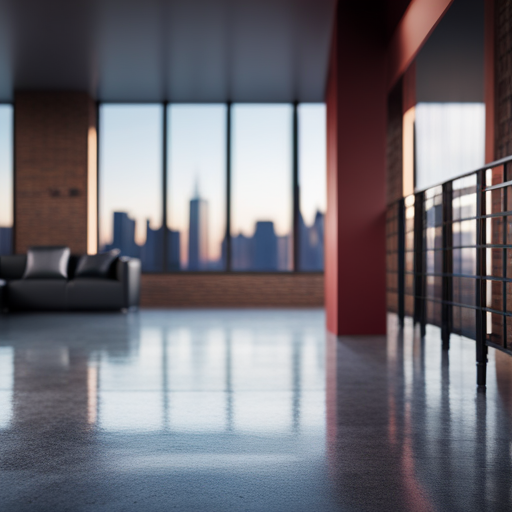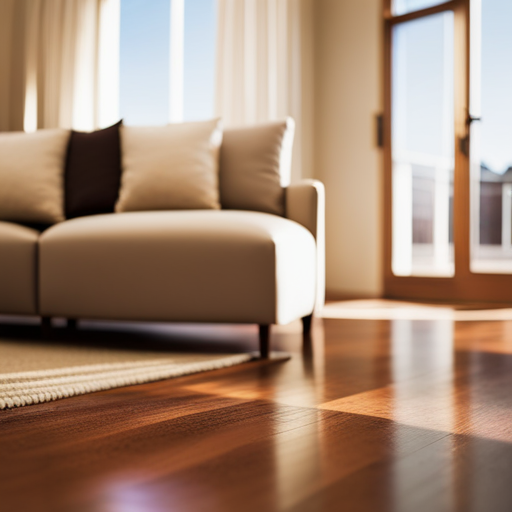Flooring and Its Effect on Property Appraisals

Did you know that the type of flooring in a property can significantly impact its appraisal value?
Flooring plays a crucial role in determining the overall value of a property, with various materials such as hardwood, laminate, carpet, and tile exerting different effects on appraisals.
Understanding the influence of flooring choices on property appraisals is essential for homeowners and real estate professionals alike.
In this article, we will explore the intriguing relationship between flooring and property valuations.
Importance of Flooring in Property Appraisals
The type of flooring used in a property plays a significant role in determining its overall value during the appraisal process. Flooring materials are a crucial factor in property appraisals as they directly impact the aesthetics, functionality, and maintenance costs of a property. Different flooring materials such as hardwood, laminate, tile, carpet, and vinyl have varying levels of durability, maintenance requirements, and visual appeal.
For instance, hardwood flooring is often favored for its durability and timeless aesthetic, while carpet may require more frequent cleaning and replacement due to wear and tear. Maintenance costs associated with flooring, including installation, repairs, and upkeep, are carefully considered during the property appraisal process. Appraisers take into account the long-term expenses related to maintaining the flooring, which can ultimately influence the property’s appraised value.
Understanding the implications of flooring materials and their associated maintenance costs is essential for property owners and buyers alike, as it directly impacts the appraisal value and overall desirability of the property.
This understanding sets the stage for discussing the impact of hardwood flooring on property values.
Impact of Hardwood Flooring on Property Values
When assessing property values, the presence of hardwood flooring not only enhances aesthetics but also contributes to increased durability and long-term value retention. Hardwood flooring holds a significant impact on property values due to several key factors:
-
Maintenance Costs: Hardwood flooring typically requires less maintenance compared to other flooring options, such as carpets. This lower maintenance need can translate to cost savings for homeowners and contribute to the overall appeal of the property.
-
Aesthetic Appeal: Hardwood flooring is renowned for its timeless beauty and elegance. Its natural warmth and versatility in complementing various interior design styles make it a highly desirable feature for homebuyers, positively influencing property values.
-
Longevity: Hardwood flooring is known for its longevity, often lasting for decades when properly cared for. This longevity adds to the property’s value, as it reduces the need for frequent replacements or renovations.
-
Resale Value: Homes with hardwood flooring tend to have higher resale values. The enduring appeal and durability of hardwood flooring make it a valuable investment for homeowners, ultimately impacting property appraisals positively.
Evaluating the Value of Laminate Flooring
Evaluating the value of laminate flooring is important in understanding its impact on property values. There are several factors to consider, such as cost-effectiveness, visual appeal, and longevity compared to other flooring options.
Laminate flooring is known for its durability, often outlasting traditional carpeting and requiring less maintenance. Its hard, wear-resistant surface makes it ideal for high-traffic areas, reducing the need for frequent repairs or replacements. This not only saves homeowners money but also contributes to its overall cost-effectiveness.
The durability of laminate flooring is a significant factor in its appraisal value. Its ability to withstand wear and tear over time adds to the property’s appeal and can result in a higher appraised value. Additionally, the reduced maintenance costs associated with laminate flooring can be an attractive selling point for potential buyers, further enhancing its impact on property values.
Transition: Moving from evaluating the value of laminate flooring, it is essential to consider the implications of carpeted areas on property appraisals.
Considerations for Carpeted Areas in Property Appraisals
Transitioning from evaluating the value of laminate flooring, it is essential to consider the impact of carpeted areas on property appraisals. Carpeted areas can significantly influence the overall value of a property, and the following considerations are crucial when assessing their impact:
-
Carpet Durability: The durability of the carpet is a key factor in property appraisals. High-quality, durable carpets can enhance the value of a property, as they are likely to last longer and require less frequent replacement.
-
Maintenance Costs: When appraising a property with carpeted areas, it is important to consider the ongoing maintenance costs. Factors such as professional cleaning, stain removal, and regular upkeep should be taken into account when determining the overall value of the property.
-
Aesthetic Appeal: The visual impact of carpeted areas plays a significant role in property appraisals. Well-maintained, aesthetically pleasing carpets can enhance the overall appeal of the property, potentially increasing its value.
-
Potential Allergens: Appraisers should also consider the potential impact of carpeted areas on indoor air quality and allergen accumulation. Properties with hypoallergenic or low-allergen carpets may be more appealing to potential buyers, positively influencing the property’s appraisal value.
Assessing Property Value With Tile Flooring
Considering the impact of tile flooring on property appraisals, the material’s durability and visual appeal are key factors influencing the overall value of a property. When assessing durability, tile flooring often outperforms other materials such as carpet or laminate. This durability leads to lower maintenance costs over time, as tile is less susceptible to damage from foot traffic, spills, and other common sources of wear and tear. Additionally, the visual appeal of tile flooring, especially in kitchens, bathrooms, and entryways, can significantly enhance the aesthetic value of a property. Potential buyers or tenants often find tile flooring to be more attractive and desirable compared to other flooring options, which can positively impact the property’s appraisal value.
| Durability | Maintenance Costs | Visual Appeal |
|---|---|---|
| Resistant to wear | Lower maintenance | Enhances aesthetics |
| Durable against spills and stains | Reduced repair costs | Attractive in key areas |
| Longevity | Cost-effective over time | Adds value to property |
| Minimal upkeep needed | Saves on replacement costs | Creates a positive impression |
| Withstands heavy foot traffic | Low long-term costs | Boosts property’s appeal |
Frequently Asked Questions
What Are the Most Popular Flooring Trends in Today’s Real Estate Market?
In today’s real estate market, eco-friendly options and luxury vinyl are among the most popular flooring trends. Homeowners are increasingly prioritizing sustainable materials and seeking the durability and aesthetic appeal offered by luxury vinyl.
How Does the Maintenance of Different Types of Flooring Affect Property Appraisals?
Maintenance costs associated with different flooring types can significantly impact property appraisals. Neglected flooring can lead to property depreciation, while well-maintained flooring enhances value. It’s crucial for homeowners to prioritize regular upkeep to maintain property value.
Are There Any Specific Flooring Materials That Can Negatively Impact Property Values?
When considering property values, the type of flooring can significantly impact appraisals. Factors such as hardwood vs. laminate, tile vs. vinyl, and the condition of the flooring can influence the perceived value of a property.
What Are the Potential Drawbacks of Installing Carpet in Certain Areas of a Property?
Carpet installation in certain areas of a property may pose drawbacks such as difficulty in maintenance, susceptibility to stains and wear, and potential impact on property appraisals due to evolving flooring trends favoring hard surfaces.
How Does the Color and Design of Flooring Impact Property Appraisals?
The color and design of flooring can significantly impact the aesthetics and atmosphere of a space. It affects the overall feel and visual appeal, influencing the property’s perceived value. Texture and color choices also play a role in installation costs and material selection.
Conclusion
In the intricate tapestry of property appraisals, flooring plays a vital role in shaping the perceived value of a property. Like the threads of a finely woven rug, the type of flooring can add depth and richness to the overall assessment.
Whether it’s the timeless elegance of hardwood, the practicality of laminate, the comfort of carpet, or the durability of tile, each choice contributes to the narrative of a property’s worth.

Rubin Everest, a seasoned expert in the world of flooring, brings a wealth of knowledge and passion to the surface. As the mind behind ebbow.com, Rubin is dedicated to sharing insights on the latest trends, innovative solutions, and expert advice in the realm of flooring. Whether you’re seeking practical tips for installation or design inspiration, Rubin Everest is your go-to source for all things flooring-related, making your journey to the perfect floor an informed and enjoyable experience.





